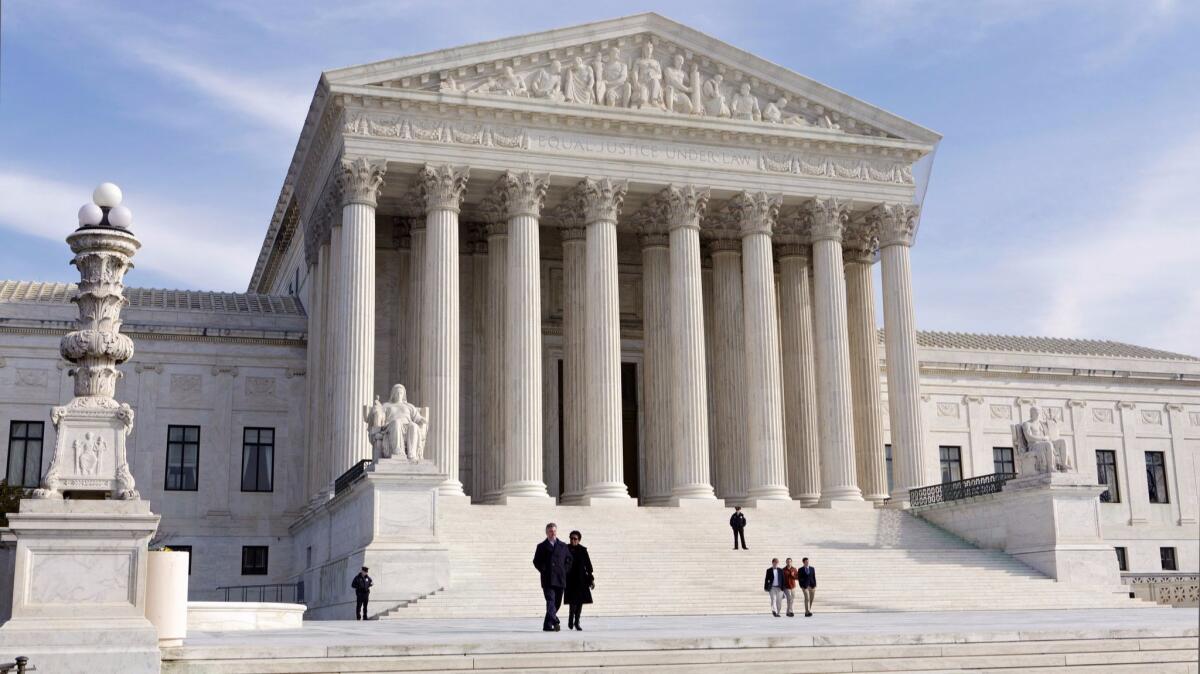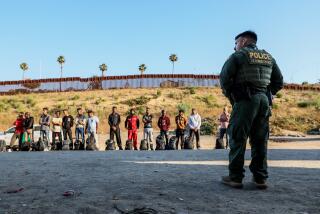Supreme Court’s conservatives shield border agent in killing of unarmed teen in Mexico

- Share via
WASHINGTON — The Supreme Court’s conservative majority on Tuesday shielded a U.S. border agent from being sued for shooting and killing an unarmed teenager standing on the Mexican side of the Rio Grande.
Ending a 10-year legal battle, the justices by a 5-4 vote said neither Congress nor the Constitution clearly authorized damage suits over incidents and injuries that occur beyond U.S. borders.
The ruling in Hernandez vs. Mesa provides a stark example of the court’s determination to limit damage suits against government officials.
Rep. Joaquin Castro (D-Texas), chairman of the Congressional Hispanic Caucus, called the ruling “an assault on basic civil and human rights. The U.S. Supreme Court today has legalized murder without cause in cases where a U.S. border patrol agent shoots a Mexican national standing on the Mexican side of the border.”
The case began in 2010 when 15-year-old Sergio Adrian Hernandez was playing a dangerous game with several friends in the dry culvert separating El Paso from Ciudad Juarez, Mexico. The boys ran up the embankment on the U.S. side, touched the border fence and then ran back to the Mexican side.
Agent Jesus Mesa Jr., riding a bike, came upon the boys. He pulled out his gun and fired two fatal shots at one of the teenagers who was standing on the Mexican side of the border. Mesa later claimed that the boys had pelted him with rocks.
The Justice Department investigated the shooting but brought no charges against the agent. The U.S. also refused to extradite him to Mexico.
The teenager’s parents then filed a wrongful death suit, alleging the agent had violated the 4th Amendment’s ban on “unreasonable searches and seizures” and the 5th Amendment’s protection against depriving someone of “life... without due process of law.”
Ever since, the federal courts have gone back and forth on whether the parents’ suit could proceed. The Supreme Court took up the case once before, but in 2017 sent it back to Texas without reaching a final decision.
While the Constitution protects the rights of individuals from actions by the government, the court has said that it is up to Congress to decide whether victims whose rights are violated may sue and win damages. After the Civil War, Congress said states and local government officials can be forced to pay for violating constitutional rights. But the situation is less clear for federal agents.
Speaking for the court Tuesday, Justice Samuel A. Alito Jr. explained the “Constitution’s separation of powers requires us to exercise caution before extending” liability and claims for damages “to a new context, and a claim based on a cross-border shooting is markedly new ... and has foreign relations and national security implications.”
In 1971, the court had said in Bivens vs. Six Unknown Named Agents that FBI agents could be sued for violating the 4th Amendment. But Alito said the court was unwilling to go further.
“Because of the distinctive characteristics of cross-border shooting claims, we refuse to extend Bivens into this new field,” he said. Chief Justice John G. Roberts Jr. and Justices Clarence Thomas, Neil M. Gorsuch and Brett M. Kavanaugh agreed.
In a concurring opinion, Thomas, joined by Gorsuch, said “the time has come to consider discarding the Bivens doctrine altogether.” If so, this would leave Americans with little or no remedy in court if a federal agent, for example, broke into their home or otherwise violated their constitutional rights.
In a series of rulings, the high court has said that officials, agents and the police have a qualified immunity that protects them from being sued in all but extreme cases. If the majority agrees with Thomas, the court could close the door to damage claims even in extreme cases.
Dissenting for the court’s liberals, Justice Ruth Bader Ginsburg called the agent a “rogue officer” who while standing on U.S. soil was accused of “using lethal force against a person who poses no immediate threat to the officer and no threat to others.” This is a classic definition of an unreasonable use of force forbidden by the 4th Amendment, she said.
“Although the bullet happened to land on the Mexican side of the culvert, the United States unquestionably has jurisdiction to prescribe law governing a border patrol agent’s conduct.... Even accepting that the setting in this case could be characterized as ‘new,’ there is still no reason why Hernandez’s parents should face a closed courtroom door,” she said. Joining her in dissent were Justices Stephen G. Breyer, Sonia Sotomayor and Elena Kagan.
ACLU attorney Lee Gelernt, who argued a similar border shooting case in Nogales, Ariz., called the decision ominous. “The gravity of this ruling could not be clearer given the Trump administration’s militarized rhetoric and policies targeting people at the border,” he said. “Border agents should not have immunity to fatally shoot Mexican teenagers on the other side of the border fence.”
More to Read
Get the L.A. Times Politics newsletter
Deeply reported insights into legislation, politics and policy from Sacramento, Washington and beyond. In your inbox three times per week.
You may occasionally receive promotional content from the Los Angeles Times.











